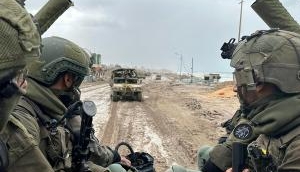Nawaz Sharif: between a rock and a hard place

The third-time prime minister of Pakistan, with a comfortable majority in National Assembly and set to appoint his fifth Army Chief, a distinction no other PM has enjoyed, Nawaz Sharif finds himself cornered.
The reasons are the same character flaws that led to his premature dismissals during his earlier stints as PM in 1993 and 1999 - demanding absolute control and considering himself above accountability.
On previous occasions, Nawaz ran into trouble with a powerful president or army chief. This time around, he has three fronts to contend with - the judiciary, Imran Khan and the army. The coalescence of these fronts over the next 15 days, if not earlier, makes Nawaz's position precarious.
The common denominator linking the judiciary and Imran Khan are the Panama Papers regarding off-shore companies registered in the name of Nawaz's children. Nawaz has stalled any enquiry on the issue for the last six months.
After initial hesitation, a three- judge bench of the Supreme Court is now slated to take up the case filed by the Pakistan Tehreek-e-Insaf (PTI) on 20 October. The court accepted the PTI's request for early hearing of its petition, but it will also take up four other pleas that deal with the same subject and seek different remedies.
Imran Khan's plea seeks disqualification of Nawaz Sharif; two others call for formation of a judicial commission to probe the offshore companies, one demands the inquiry by investigating agencies, while the fifth opposes any enquiry on the grounds that 'offshore investments are not illegal'.
Easy target
Imran Khan found in the Panama Papers a golden opportunity to target Nawaz, especially after his earlier campaign on rigged elections floundered.
After an unexpectedly successful march and 'jalsa' in Raiwind on 30 September, near Nawaz's family home, Imran has now threatened to 'lockdown' Islamabad on 2 November, if by then Nawaz has either not resigned or presented himself for investigation.
By not waiting for the Supreme Court decision, Imran has staked his political career on this thretened'lockdown' - a debacle could be fatal for his political fortunes.
The government is equally determined to prevent any kind of 'lockdown' of Islamabad. Quite likely there would be mass arrests of PTI leaders and workers in the coming days in a bid to scuttle the threat.
Thus, as of now, a confrontation is looming. Whether such a confrontation becomes violent and bloody will depend on Imran Khan's ability to mobilise enough numbers to force a 'lockdown' of the national capital and the determination of the government to prevent it from happening.
The confrontation does not bode well for Nawaz. In the 2014 'dharnas' of Imran Khan and Tahir-ul-Qadri, it was General Raheel Sharif who bailed Nawaz out and declined to use the opportunity of the confrontation to play politics.
This time around, Nawaz cannot be sure about General Sharif for reasons that are of his own making.
No army support
Despite having demonstrated his nonpolitical credentials, Nawaz hasn't got along with General Sharif due to the latter's popularity.
The general has led from the front and demonstrated leadership in crisis situations while Nawaz remained tucked away in Islamabad, Lahore or abroad. Not surprisingly, the population sees General Sharif as their saviour rather than the civilian Sharif.
In practical terms, this has resulted in the army under General Sharif taking over all issues of foreign, defence and security policies - areas that Nawaz would have liked to be his preserve.
Nawaz perceived an opportunity to put the general in his place due to a slew of terrorist incidents in Quetta Peshawar, Mardan, Shikarpur and Mohmand over the last month or two. These attacks became a vital point of attack despite the army's success in the ongoing Operation Zarb-e-Azb against terrorists in tribal areas. .
In addition, the surgical strikes carried out by India in response to the Uri attack had put the general on the defensive. With his impending retirement on 29 November, Nawaz felt that General Sharif would be a lame-duck chief and he could claw back some space ceded to the military.
The matter of stories
The ploy used was the 'leaked' story to Dawn published on 6 October about a closed-door security meeting held between the civilian and military leadership on 3 October. The story sought to convey that the civilians had asked the military to jettison the non-state actors else Pakistan would face isolation.
Nawaz and his team failed to account for two crucial factors. First, Cyril Almeida and his editor refused to back down and stuck by their story, despite the reporter being clumsily put on the Exit Control List.
Second, the army saw this as an affront to their institution against the backdrop of all the sacrifices they had made during Zarb-e-Azb. The Corps Commanders called it a 'breach of national security.'
Resultantly, in the two tense meetings held between them, the last being on 17 October, General Sharif supposedly told the PM clearly that those in the PMO responsible for the leak had to be brought to book. A time limit of five days had apparently been given.
The army is unlikely to back down since it has seen through Nawaz's game and dug in its heels that a 'breach of national security' cannot be condoned.
Media speculation is that those responsible for the leak quite possibly include a federal minister, senior bureaucrats in the PMO and also Nawaz's daughter who heads the PM's media cell.
The bureaucrats have let it be known that if they are arrested and made scapegoats of they will spill the beans on who authorised the leak.
Courting issues
Nawaz thus finds himself in a corner. Not acting against the culprits may lead to the army proceeding on its own. Under the Army Act, civilians can be tried for breach of national security. If he does act, Nawaz will have to make some pretty big sacrifices.
Meanwhile, the hearing in the Supreme Court on the 20 October, as well as the confrontation with Imran Khan on 2 November, looms unless Nawaz caves into Imran's demands and quits or submits himself for investigation.
It will require a lot of acumen, flexibility and maturity on the part of Nawaz, traits he is unfortunately not known for, to come out of this unscathed. The stage is thus set for some fast-paced developments in Pakistan over the coming weeks.
The author retired as Special Secretary in the Cabinet Secretariat, Government of India
First published: 19 October 2016, 11:46 IST





![BJP's Kapil Mishra recreates Shankar Mahadevan’s ‘Breathless’ song to highlight Delhi pollution [WATCH] BJP's Kapil Mishra recreates Shankar Mahadevan’s ‘Breathless’ song to highlight Delhi pollution [WATCH]](https://images.catchnews.com/upload/2022/11/03/kapil-mishra_240884_300x172.png)

![Anupam Kher shares pictures of his toned body on 67th birthday [MUST SEE] Anupam Kher shares pictures of his toned body on 67th birthday [MUST SEE]](https://images.catchnews.com/upload/2022/03/07/Anupam_kher_231145_300x172.jpg)






